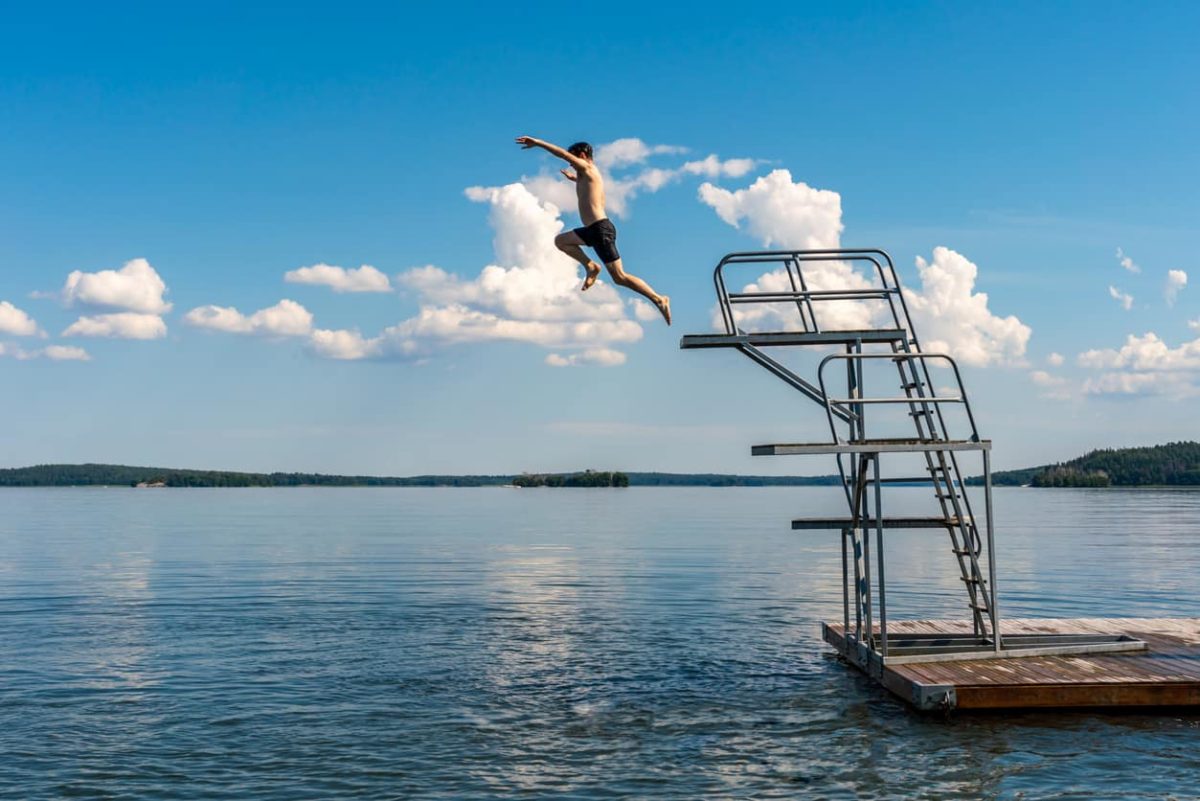
On stifling summer days, nothing is more refreshing than jumping (or sliding) into a cool river, lake, or swimming pool. Danger seems far away when you’re spending an afternoon with family or friends, enjoying a picnic, and splashing around in the water.
But before you pack your cooler and beach chairs and jet off for a day by the water, make sure you’re equipped to keep yourself and others safe. Water activities are notoriously dangerous, especially in unknown or secluded areas such as murky lakes or deceivingly calm inlets.
Diving, boating, and water skiing-related accidents make up a large chunk of partial and total paralysis cases. In fact, diving accidents caused 1,973 spinal cord injuries in 2020 alone, a year when lots of pools and public swimming areas were closed due to the coronavirus.
Now that facilities across the U.S. are swiftly reopening, it’s important to have a refresher on water safety. Keep reading for some smart tips for safe summer fun.
1. Check water depth.
Love diving? Make sure the water is deep enough before you enter it head-first. The Red Cross warns against diving in water that is less than nine feet deep.
Even if you are not particularly tall, you can sustain serious or life-threatening injuries diving into shallow water. Misjudging or failing to check the depth of a swimming hole can result in lifelong injuries, often affecting people in the prime of their lives. Young people who suffer severe spinal cord injury often have to rely on family to help them carry out basic everyday functions, like going to the bathroom.
Before you dive, check the depth. If you don’t know how deep the water is, don’t dive.
2. Understand that visibility doesn’t guarantee safety.
Wind, changing currents, and recent storms can all affect the way sediment moves and settles. Depending on where the sediment moves in these situations, water can appear deeper or more shallow than it actually is.
Whether you’ve swum in this particular area every day for 20 years or have just discovered the spot, you should step into the water and test its depth before diving, swimming, or participating in any other water-related activity.
Just because you can’t see the bottom of the pool, lake, or river doesn’t mean that it’s deep enough to dive into. Water depth can be extremely misleading, so it’s always safest to step into or test the water first.
3. Be aware of rip currents.
Rip currents can be found in any area of water with breaking waves, large lakes included. These currents don’t pull people under – they pull swimmers away from shore, and it’s when a swimmer panics and starts thrashing around in the water that the current becomes too much to handle.
Swimmers who fight against the current will quickly grow tired and are far more likely to drown. To avoid getting stuck in a rip current, follow these tips provided by the United States Lifesaving Association:
- Always swim in areas where lifeguards are present.
- Speak to the lifeguard before entering the water; ask them about swimming conditions for the day.
- Make sure you and your children know how to swim in the surf; swimming in a pool is not the same as swimming in the ocean or lake.
- Learn to identify rip currents and take the time to evaluate water conditions before getting in.
4. Be extremely judicious with alcohol.
Ideally, no one would consume alcohol and swim or participate in another water-based activity. Realistically, people like drinking on or by the water, so if you imbibe, it’s important to do so as safely as possible.
Studies show that as blood alcohol increases, so does the likelihood of drowning. According to data from the journal Injury Prevention, alcohol has been found in the blood of 30-70% of people who drown during recreational water activities.
That’s because alcohol dehydrates your body, impairs your judgment, slows your reflexes, and affects your body’s ability to regulate internal temperature. Any of these effects could cause you serious injury or even death. Here are a few ways to keep yourself and others safe when alcohol and water activities are mixed:
- Don’t drink if you are responsible for watching children
- Don’t engage in water activities with children after drinking
- Don’t leave anyone alone who has been drinking
- Don’t allow yourself to feel pressured to get in the water or operate a boat after drinking
Types of Spinal Cord Injuries Related to Water Activities
Water-related spinal cord injuries aren’t limited to diving. Other activities like swimming, waterskiing, and boating can cause serious injury or even death. Depending on the type and location on the spine, spinal cord injuries may lead to lifelong paralysis in one or several limbs.
These are just some of the injuries affecting people hurt in diving, swimming, and other water-related accidents (most injuries occur in the cervical spine):
- Flexion injuries
- Anterior subluxation – Sprain affecting the ligaments in the neck
- Wedge fracture (compression fracture) – Excessive force causes a vertebra to break
- Flexion teardrop fracture – Impact from diving causes a break in the cervical spine, along with injury to ligaments.
- Extension injuries
- Hangman’s fracture – Sudden, forceful hyperextension centered on the chin causes a break in the vertebrae of the neck
- Posterior C1 arch fracture – Axial loading (force directed through the top of the head and through the spine) causes a break in the C1 vertebrae.
Help for Victims of Spinal Cord Injury
Spine and spinal cord injuries are some of the most life-threatening dangers affecting swimmers and divers. Unfortunately, some of these injuries can be attributed not to the victim’s actions, but to the fault of a negligent third party, such as the owner of a swimming pool or reckless boat driver.
If you or a family member suffered a spine injury in a water-related accident, you deserve justice and compensation to pay for your medical expenses.
Call Langdon & Emison today at (866) 931-2115. We’ll fight for you and get you every penny of the money you deserve.


